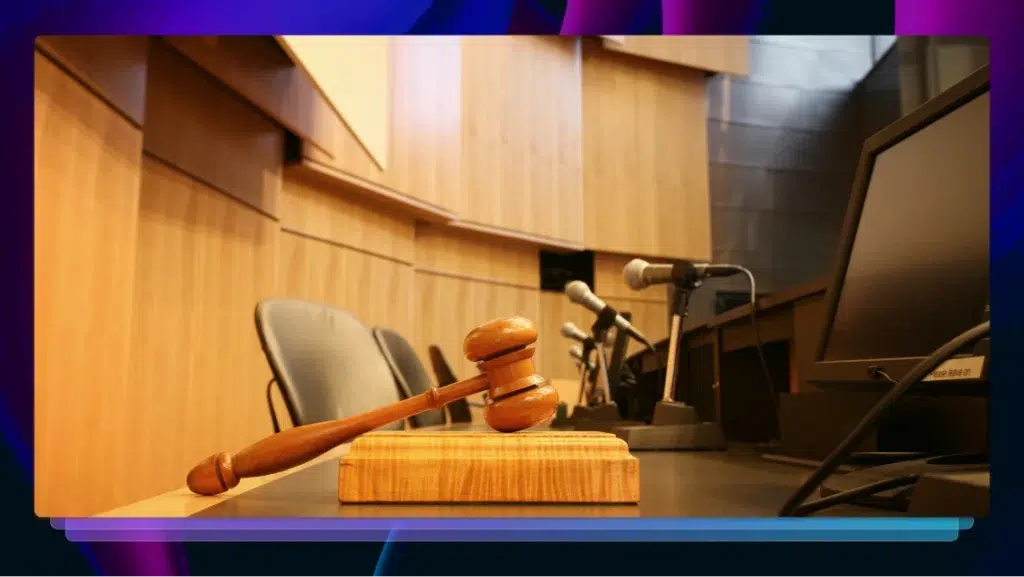Stenography, AI, and the Future of Steno Tech
AI can be a revolutionary tool for stenographers. Learn about steno AI trends and how this technology can complement this important work.

Artificial intelligence (AI) is reshaping many jobs, but perhaps none more than those who deal with capturing human speech and writing. As those who specialize in this work, stenographers may feel especially intrigued — or even threatened — by the growing influence of this technology.
Stenographers are uniquely trained for the work of fast, accurate, real-time transcription. They use a stenotype machine and a special shorthand known as steno to transcribe live dialog, especially in courtrooms, medical settings, and corporate environments where error-free accounts are essential.
But, in a time when highly intelligent, efficient computers can capture human conversation fairly accurately, what does that mean for the field of stenography? Is AI a foe that threatens to displace stenographers — or a friend that can make their work more effective? We’ll explore these questions on stenography and AI below.
AI’s Interruption of Stenography
To say AI has exploded in recent years would be putting it lightly. Natural language processing — the type of AI required for services like transcription — is the second-largest market segment in this field, and it’s expected to grow in value by 40.4% per year from 2023 through 2030. This technology has already transformed transcription, making quick work of a once-cumbersome task.
The legal industry has particularly benefited from the possibilities afforded by AI court reporting and stenography. Detailed, word-for-word records are required for all court proceedings, and this has historically required a stenographer or court reporter to be physically present to transcribe every interaction.
However, AI’s growing ability to record human speech and accurately interpret has simplified the process of legal transcription and court reporting, allowing computers to transcribe live proceedings or recordings quickly. What once required hours and even days of on-site human labor can now be accomplished remotely in minutes with the help of AI tools.
Benefits of AI for Stenography in Court Reporting
Although it may seem unsettling, it’s hard to ignore the benefits of bolstering legal stenography with AI. The courtroom reporting industry has faced extreme labor shortages for the past decade, and the issue is only going to get worse in the coming years. And yet, legal proceedings will continue to require accurate records to protect and uphold our justice system. AI has already helped fill in some gaps, providing quick transcription of recordings where reporters aren’t available. Plus, AI can be leveraged in reporting at any hour of the day.
Overall, pairing AI with stenography for court reporting is incredibly cost-effective. Instead of paying around $30 an hour to have reporters in every courtroom, law firms or judges can pay a fraction of that for steno AI services while still employing professional stenographers for quality control.
Not only is stenography with AI affordable, but it’s also highly accurate (and continually improving). Our AI legal services, for instance, maintain 99% accuracy following traditional grading standards of formatting, punctuation, terminology, speaker accuracy, and context.
Concerns About Rising Tech in Stenography
That’s not to say there are no legitimate concerns surrounding the use of AI in the legal profession. First and foremost among them is accuracy — 99% may be impressive, but court records must be completely airtight when liability is on the line.
According to Bloomberg Law, 21 federal judges have already banned AI from the courtroom. Though we don’t know the exact reasoning behind this ban, the fact remains that the legal field is full of complicated jargon that requires careful interpretation. At least today, AI stenography still demands the accuracy check and skilled interpretation only a human can provide.
That fact should somewhat alleviate the second concern, which is that AI will replace human stenographers. With the need for an AI-human partnership, not to mention the growing labor shortage for court reporters, this doesn’t appear likely soon. Ultimately, AI provides tools to help human stenographers accomplish their work.
Security is another critical concern around AI, and it’s particularly relevant in the courtroom setting. With sensitive evidence and personal information being recorded, any AI used for legal stenography must use file encryption and strictly adhere to HIPAA standards.
Looking Ahead: Steno Tech Trends
These advancements in stenography AI promise to continue to reshape the profession and what stenographers can accomplish.
Looking ahead, it’s easy to imagine a (near) future in which:
- Live court reporters work with an AI assistant (and other major court reporting tools) that helps them catch and call out unclear statements or phrasing that witnesses or deponents need to repeat.
- Certified court reporters review AI transcriptions of recorded proceedings or depositions to verify accuracy.
- Steno AI services provide real-time translation of court proceedings in another language.
- AI-powered robots and computers become more fully trained in speech recognition for legal language to provide more accurate transcriptions.
How to Learn More About Steno Tech
Stenographers and other key players in the legal profession must keep on top of this evolving steno AI technology and its impact on all aspects of the industry. Here are a few tools and resources you can use to stay up to speed.
Steno Apps
There are a variety of apps available to help stenographers do their work more efficiently. Some of the top examples are:
- Typey Type for Stenographers: This app is designed to help beginning stenographers master the art of shorthand and capturing conversation.
- Stenote: This app is designed to capture real-time conversations, record them, and even provide “actionable insights.”
- Rev: A great option for audio and video recordings, Rev can create ASCII-formatted transcripts with 99% accuracy in less than 24 hours.
Steno Podcasts
Although it’s a relatively niche field, there are several podcasts about stenography available. Some of the most popular options are:
- Confessions of a Stenographer: This podcast covers a variety of topics, interviewing experts in the industry to provide insights and breaking news.
- The Court Reporter Podcast: Aimed at “freelance, official, and aspiring court reporters,” this podcast supports stenographers and their unique role in the justice system.
- Modern Court Reporter: A podcast designed for court reporting students, it features interviews with a range of professionals in the industry.
- Steno Talk: Steno Talk brings together professionals and students to share tips and provide mutual support.
Other Resources
Podcasts and apps aren’t the only tools available for stenographers and professional or aspiring court reporters. Here are several other resources you can use to keep up with developments in the industry or connect with other professionals:
- National Court Reporters Association: The NCRA has been around for more than a century, supporting court reporters with industry expertise, networking, and training opportunities.
- Court Reporting Insider: This news site provides regular updates about breaking news and trends within the industry.
- Court Reporters of Facebook: An online group of nearly 5,000 members, this is an opportunity to connect with other court reporters virtually for conversation and support.
- The Rev Legal Blog: The legal section of Rev’s blog is a treasure trove of resources about the intersection between technology and stenography/transcription work.
Try the Ultimate Online Stenography Solution
AI is rapidly transforming the field of stenography, and courtrooms and other legal proceedings are right at the center of this change. With the right legal automation tools, stenographers and others in the legal field can leverage this technology to make their work more productive and efficient.
Rev’s legal transcription services provide world-class Automated Speech Recognition and a pool of legal transcriptionists to deliver on-time, 99% accurate transcriptions of recorded proceedings. All transcriptions are fully customizable and compatible with all major court reporting software.
Learn more about Rev’s legal transcription services, and get started today.
Heading
Heading 1
Heading 2
Heading 3
Heading 4
Heading 5
Heading 6
Lorem ipsum dolor sit amet, consectetur adipiscing elit, sed do eiusmod tempor incididunt ut labore et dolore magna aliqua. Ut enim ad minim veniam, quis nostrud exercitation ullamco laboris nisi ut aliquip ex ea commodo consequat. Duis aute irure dolor in reprehenderit in voluptate velit esse cillum dolore eu fugiat nulla pariatur.
Block quote
Ordered list
- Item 1
- Item 2
- Item 3
Unordered list
- Item A
- Item B
- Item C
Bold text
Emphasis
Superscript
Subscript

Subscribe to The Rev Blog
Sign up to get Rev content delivered straight to your inbox.







